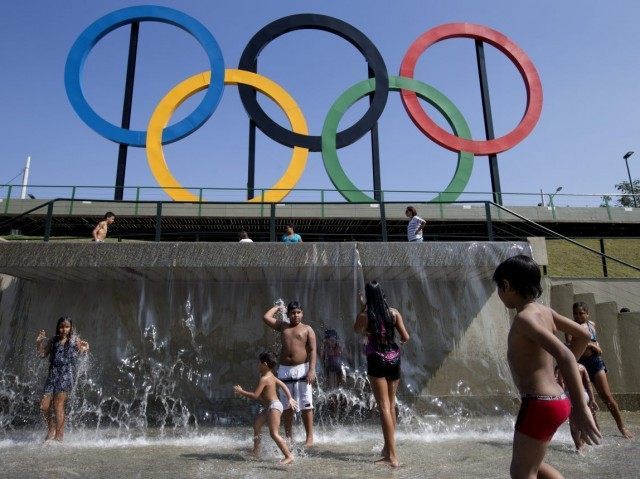Last fall, the U.S. Olympic Committee (USOC) published an internal memo that expressed concern that Brazilian authorities would not properly clean the water in Rio de Janeiro before the 2016 Summer Olympics.
“Water improvement plans that were projected to take place by the host organizers will not happen for the largest part,” the memo read. “The initial agreement with the Rio organizers was to create multiple water treatment facilities in Rio to improve the water quality of the competition venues. These processing facilities were not built and will not be built in the immediate future to impact water quality at the Games.
—
“The IOC and Rio Organizing Committee recognize that the water quality in and around Rio is for the most part not at an acceptable level and there [are] significant fluctuations in the bacterial and viral contaminants at the competition venues,” the memo said. “The levels of pathogens will fluctuate depending upon environmental impacts and especially with significant rains. The IOC is tracking the weather impact using historical data. Additionally the IOC and Rio organizers are studying the current flows in and around the competition venues.”
Athletes sign a consent form, but an USOC spokesman told ESPN the Zika virus and water quality might change the form “to reflect conditions expected this summer.”
Despite the name, the Summer Olympics will take place during winter in Brazil, so officials hope the cooler weather will kill the Aedes aegypti mosquito known to spread Zika and diminish the threat. Spring begins in the Southern Hemisphere in September.
Last week, an Australian doctor with the Olympic team posed similar concerns. Tests found “disease-causing viruses” in the Guanabara Bay and aquatic venues, including sailing, rowing, canoeing, open-water swimming, and triathlon.
“If someone gets a nasty gastro infection, vomiting and diarrhea, it’s not ideal for competing in an Olympic environment,” explained Dr. David Hughes. “Rio poses a multitude of medical challenges when it comes to keeping our athletes and officials safe. We have had many teams go to Rio, we are aware of the water quality issues. We have protocols in place to minimize the risk, but you can’t make the risk zero.”
USOC CEO Scott Blackmum said no one has informed him “of any significant changes in water quality or infrastructure improvements since the USOC’s October 2015 memo was written.”
“I think we started talking about [water-quality issues] a couple of years ago, honestly,” he told ESPN, adding:
This is a challenge. I think it’s important for the Olympic movement to go to new places and to bring the Olympic Games to continents and countries that haven’t had the opportunity to host it. When you go to less developed countries, one of the outcomes is that you’re going to have different conditions. Unfortunately, I think we all thought the Olympic Games could be a catalyst for improvements in Rio, and then all hell broke loose with the economy. I wish we could do something to change it. At this point in time, we can’t.
But right now, the Zika virus weighs heavier on people’s minds. The Australian Olympic Committee encouraged its female athletes to educate themselves about Zika and “consider the risks of competing in the Rio Olympics due to the outbreak of Zika.”
“Any team members who are pregnant at the time of the Games need to consider the risks very carefully before deciding whether to proceed with travel to Brazil,” they said.
The Brazilian government has advised women to delay pregnancy for up to two years due to the possible connection to microcephaly, a rare birth defect that occurs when the brain does not form properly during pregnancy.
Olympic Spanish swimmer Mireia Belmonte might not attend the 2016 Summer Olympics in Rio de Janiero due to the Zika outbreak.
“If my health is in danger, I will think about not going to the Rio games,” she said.
U.S. goalkeeper Hope Solo said the Zika virus could keep out of the Summer Olympics as well.
“If I had to make the choice today, I wouldn’t go,” she declared to Sports Illustrated.
Stadiums in Manaus, Salvador, Brasília, Belo Horizonte, and Sáo Paulo will host the Olympic soccer games instead of those in Rio de Janeiro. They hosted games during the 2014 World Cup. But those areas “have higher rates than Rio of mosquito-borne viruses like Zika, dengue, chikungunya and malaria.”

COMMENTS
Please let us know if you're having issues with commenting.